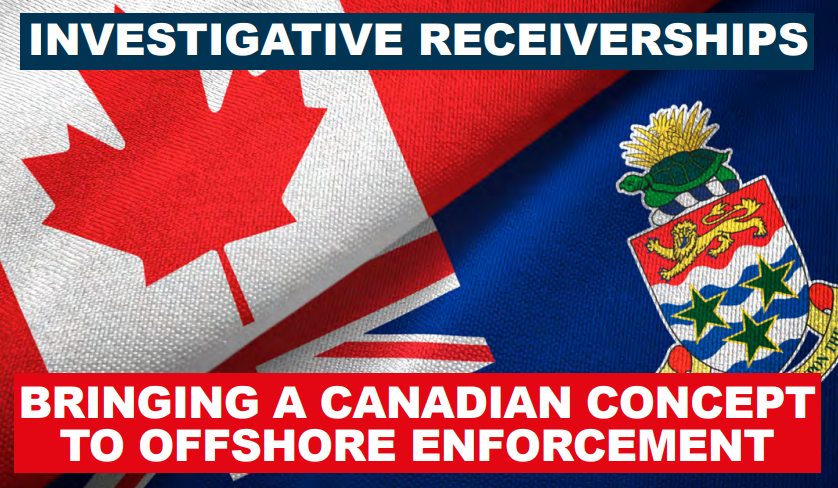Knowledge Hub
Join the Conversation!
Impartial and independent, ThoughtLeaders4 FIRE Knowledge Hub hosts cutting edge industry content and insight.
Email maddi@thoughtleaders4.com to submit content.
Investigative Receiverships: Bringing a Canadian Concept to Offshore Enforcement
Date: 15/07/2020 Type: Articles Topic: FIRE | International | Enforcement |Judgment creditors are often cursed by asymmetrical information. When it comes time to enforce, a debtor will already know what assets it owns and where those assets are located. Unscrupulous debtors will try to hide or transform their assets through layers of transactions designed to frustrate enforcement. Bridging that informational gap requires the creative deployment of various investigative tools on behalf of the creditor.
In recent years, Canadian law has developed a remedy usually termed an investigative (or investigatory) receivership to help address the informational imbalance between debtors and creditors. An investigative receiver is a court-appointed receiver with investigative powers only. The investigative receiver is not empowered or authorized to seize or freeze any assets or to unduly interfere with a debtor’s business. Its purpose is to monitor, investigate and report on a specific matter under a tailored and limited mandate from the appointing court, while leaving the door open for the expansion of the receivership into a more traditional seize and sell process if the circumstances warrant.
The concept has proven sound and effective, and its potential use is not limited to Canada. Investigative receiverships are theoretically possible in Commonwealth offshore jurisdictions like the Cayman Islands, Bermuda and the British Virgin Islands and should be embraced by local practitioners and courts. In Canada, investigative receivers are appointed under the court’s jurisdiction to appoint an interlocutory receiver in any case where it appears ‘just and convenient’ to do so and on terms that the court may set. This familiar wording is also applicable to receiverships in Cayman, Bermuda and BVI, where the jurisdiction was similarly inherited from England. The common source of the courts’ jurisdiction to appoint receivers, and the flexible nature of the remedy, strongly support the view that in appropriate circumstances offshore courts should be able to appoint investigative receivers and that the Canadian cases would provide useful guidance on their scope and use.
In the leading appellate decision on investigative receiverships, Akagi v Synergy Group (2000) Inc., 2015 ONCA 368, the Ontario Court of Appeal noted that the primary purpose of an investigative receiver is to combat the informational imbalance that exists between a creditor and a debtor. While the law provides creditors with various remedies to ascertain what assets exist for execution, these may be stonewalled or obstructed by a debtor or other parties.
In those cases, courts have seen the utility in appointing an investigative receiver to look into specific issues, transactions or parties without exercising the usual control and possession functions. The limited mandate provides for an investigation backed by the approval and imprimatur of the court but without committing to a full-blown receivership. The limited nature of the appointment is a feature, not a bug. First, it should be less costly for the creditor than having to fund a traditional receivership. The step-by-step process allows the receivership to be expanded if investigations are fruitful and scaled back or terminated if nothing comes of it. Second, because it is less intrusive than a traditional receivership, some courts have effectively set a lower legal bar for appointment because there are less concerns about the adverse impact on the debtor’s assets and affairs. A creditor may therefore secure the appointment of an investigative receiver in circumstances where it may not otherwise be possible to have a traditional receivership order made.
The Canadian experience demonstrates the flexible and practical use of the remedy:
- An employee fraudulently diverted his employer’s funds for his personal use. The employer obtained bank records that showed very small balances in the employer’s accounts but many high-value purchases and other transactions. The court appointed a receiver to investigate those transactions, identify any property acquired or generated from the transactions and to monitor that property. In particular, the receiver had powers to get in any books and records that would assist in its investigation, but no power to seize or freeze any assets.
- In a bankruptcy proceeding, the trustee identified potentially preferential and fraudulent transfers from the bankrupt companies to several related solvent entities. The trustee sought more information on the transfers using its statutory powers but was either stonewalled or received incomplete, inconsistent or unreliable information. The court appointed a receiver to investigate one of the prima facie preferential transactions with the power to compel cooperation from the recipient solvent entity.
- In a pre-judgment context where the plaintiff made out a strong fraud case, the court appointed a receiver over all of the books and records of the defendants in response to their continued delay and stifling of the plaintiff’s contractual right to examine relevant financial information.
- Again in a pre-judgment context, where there was evidence that the defendant had provided misleading information and continued to withhold information about the use of loan proceeds, the plaintiff lender obtained the appointment of an investigative receiver alongside an asset freezing order.
Canadian courts have also addressed the limits on the use of investigative receivers. Importantly, the appointment must be necessary to alleviate a risk posed to the judgment creditor’s or plaintiff’s right to recovery. It is not akin to a collective proceeding like a liquidation or a bankruptcy. The Court of Appeal in Akagi was especially critical of how the receivership in that case, initially obtained on behalf of one judgment creditor, had expanded into a far-reaching investigation for the benefit of non-party victims of the defendant’s scheme. The receivership must protect the particular interest of the judgment creditor and be necessary to overcome the inadequacy of the normal judgment enforcement process.
With the guidance from the Canadian cases and a similar legal framework, investigative receiverships could become a useful tool in the judgment enforcement toolkit in the offshore world. Practitioners should consider how this flexible remedy could be applied and look for the right opportunities to bring this Canadian concept to offshore enforcement.
Author
Mark A. Russell – KSG Attorneys at Law (Cayman Islands)
Our FIRE Corporate Partners

































